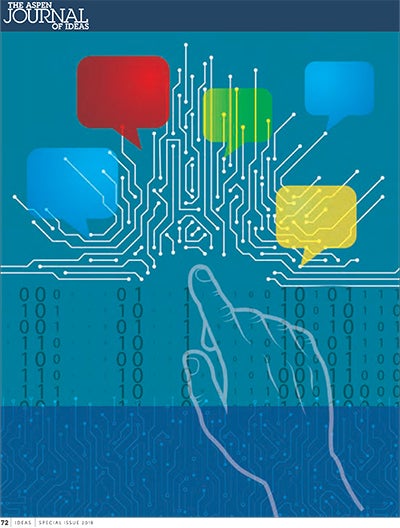 If asked, Alexa can tell you a dad joke—but it’s not the real thing. Amazon’s automated assistant can do no more than repeat a few canned lines. Like all the digital assistants touted to the public as powered by “artificial intelligence,” Alexa lacks the spark, the humor, that is the hallmark of the creative process. Developing a household device able to understand spoken commands (at least some of the time) and repeat back an intelligible response is a truly remarkable feat, but it remains as far from true intelligence as a parrot that mimics the sound of its owner.
If asked, Alexa can tell you a dad joke—but it’s not the real thing. Amazon’s automated assistant can do no more than repeat a few canned lines. Like all the digital assistants touted to the public as powered by “artificial intelligence,” Alexa lacks the spark, the humor, that is the hallmark of the creative process. Developing a household device able to understand spoken commands (at least some of the time) and repeat back an intelligible response is a truly remarkable feat, but it remains as far from true intelligence as a parrot that mimics the sound of its owner.
What happens if more advanced devices do achieve a measure of creativity? Creativity isn’t something derived from a mathematical equation. The simplest thing for a child, picking a random number, is something a computer can only fake. A machine capable of coming up not just with unpredictable numbers but also with spontaneous ideas would change everything.
A recent roundtable hosted by the Institute’s Long Term Strategy Group explored the potential of AI—”the great disruptor”—and how it could radically alter the way traditional institutions function. It is hard to imagine a development that would shake humanity’s worldview more than the creation of a machine that could express a truly original thought. Participants discussed initiatives to govern AI, research into the technology’s known shortcomings, and how to make the most of any potential societal benefits in the near term. Most experts agree that the prospect of machines with minds of their own, known as “artificial general intelligence,” is a distant development decades down the road—if such a thing is even possible.
Nonetheless, this possibility should not be dismissed. AI has already accomplished more in a short time than most would have imagined. AI systems can learn from their environment, process startling amounts of data, simulate possible courses of action, and zero in on strategies with the most statistical likelihood to bring success—all without human guidance. Such systems might come up with an option that seems out of the blue, because a human could never weigh enough possible options to come up with it. That might not be a truly creative idea, but it could be a very close facsimile. Even a semi-creative robot would be a breakthrough.
Success in a world dominated by this more limited concept of AI will come more easily to those individuals and businesses prepared to maximize its potential. This means providing training in the use of algorithms to solve complex business problems across a wide variety of industries. It means making significant investments in STEM fields to ensure that the workforce has the mind-set needed to develop and deploy AI solutions effectively. Young computer scientists won’t have to worry about being displaced by AI that is able to rewrite code to master every possible situation. The world is a far too complex place for that to happen. For now.
Smart AI poses a challenge fundamentally different from, say, the introduction of robots in factories and internal combustion on the streets. AI has the potential to insert itself into fields that were never before at risk from automation. Already, lawyering, and even copy editing and writing, have seen incursions from AI algorithms.
It’s important to also recognize the limits of AI. Current systems have a narrow focus, and are best at absorbing data and evaluating the best options for action using statistics. For example, when IBM’s Watson supercomputer won Jeopardy! in 2011, it was not by coming up with clear right answers but by coming up with the most likely responses. The method wasn’t creative, but it worked. Such systems are best for augmenting, not replacing, human judgment. Instead of basing decisions on gut instinct, AI makes far more effective decisions based on data. UPS, for example, spent a decade building Orion, a system that models every possible delivery route for its 55,000 drivers to determine the most efficient path. Largely by avoiding left-hand turns, Orion’s revised routes saved the shipping giant $350 million a year. Any business that deals with complex situations and choices can take similar advantage of algorithms that do a great job of modeling potential outcomes and give people the information to make informed choices.
Because the artificial general intelligence capable of true inspiration is still far off, there is still plenty of time for today’s businesses to build an advantage by making use of the algorithms, uncreative but logical and useful, that can optimize their businesses now. Companies that fail to build this capability will certainly find themselves left behind.
Will there still be a need for inventors, thinkers, researchers, and comedians when machine intelligence reaches a level where it can come up with an original idea—particularly when enough of these machines can be cheaply deployed? That’s a much more difficult question to answer. If machines are better at coming up with ideas than humans, then our species loses its competitive advantage. Ideas, after all, are what make us who we are.